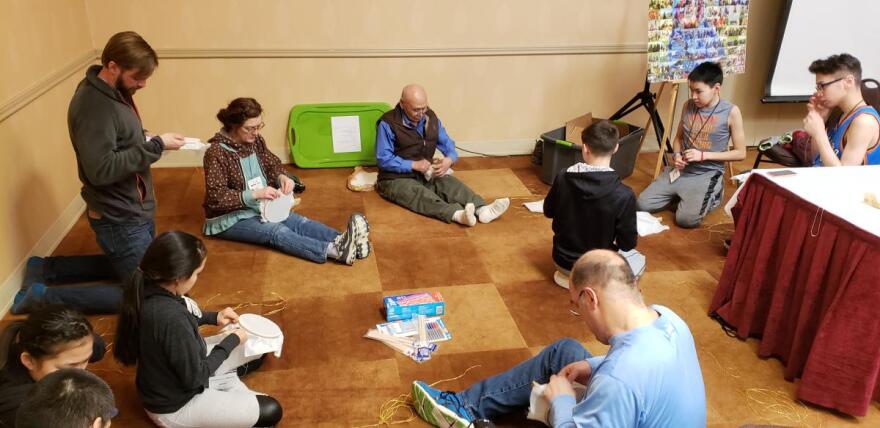Calista held a gathering of elders at a “cultural camp” in Anchorage. KYUK was there as children, elders, families and teachers gathered to learn.
“Wangkuta, anglillma nalliini…"
Most of the instruction took place in Yuqtun. Those who did not speak the language, including the teachers attending, listened respectfully, waiting for the English summary.
“Tangrarci meq. Wangkuta anglillemteni…”
Elder Nick Andrew Sr. began by talking about the importance of water to the body. Holding a plastic bottle, he said that it can also be bad for people. He compared drinking to pouring water out on the ground and making mud. He told attendees how to recognize when you need more water.
“They would tell them to spit on their hands; there would be bubbles or foam,” the translator said. "That would determine that you can drink water at that time.”
The teachers from the Lower Kuskokwim School District were at the gathering to get a better cultural understanding of the students in their classrooms. Piiyuuk Shields, 24, from Toksook Bay, crossed all the boundaries. She went to cultural camps as a child, grew up speaking Yup’ik, or Yuqtun as it is said in the language, and speaks English. Now she wants to become a teacher.
“Specifically, a Yuqtun language teacher. Hoping to teach in a Yup’ik immersion school sometime in the future,” Shields said.
She took time at the gathering to teach me about Yuqtun and how language shapes the way we think.
“Kenkakun. It means 'through love,' if you translate it literally,” Shields said. “In Yuqtun, it means 'to do things with love,' and that’s one of our really big values. Qaneryaraput power-angqellriatun ayuuquq (Our language has power). Our ability to have our language is like having a power. We have the power to speak to our Elders and know our culture, and know about our history even though we may not have learned. The example I like to give is 'qimugta,' our word for dog. In Yuqtun, qimugta means, literally, 'the one that pulls.' You’d ask question about why is it called the one that pulls.”
There were a couple of elders at the gathering who taught this reporter a Yup’ik word for which there is no English equivalent: ella.
Elder Ruth Johnny said that “ella” means everything in the whole world: the stars, the galaxy, the weather our planet, everything on it, and the capacity we all have to perceive it.
Calista CEO Andrew Guy was the first to say “ella” to me. It’s a short simple word with a lot of breath, meaning something that might take a lifetime to learn. Johnny tried to teach me how to say it correctly, but did not succeed. I could not get my tongue around it and I still don’t have it right.
Johnny knows patience. She helped start a cultural camp years ago and later became an elder. Her favorite camps are in the summer on the tundra, where kids learn to catch, pick, and put away food so they will not waste it. They also gather wild herbs.
“Labrador tea, quagcit (sour dock), ikiituks (wild celery)," she said. “You know those kinds of food.”
We are interrupted when Shields calls us to the center of the room. “You can come over and dance with us. If you don’t know the song, it’s okay. We’re going to go through the motions first.”
Johnny and the rest of us join Shields. The student teacher stands in front of the group that includes teachers, some from her own village, giving them a tiny taste of her culture as she leads them in dance.
“One-two, one-two, one-two. In this part, we really move our bodies because we are celebrating,” she said.
She wiggles as she demonstrates the moves, getting a laugh from the crowd as Byron Nicholai starts playing the drum and singing at the Calista Winter Elders Gathering, a cultural experience where learning has no boundaries.

